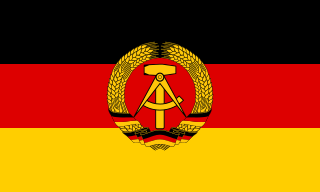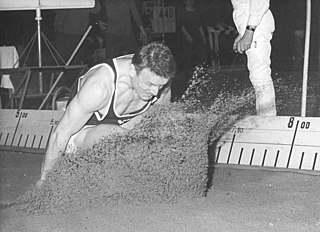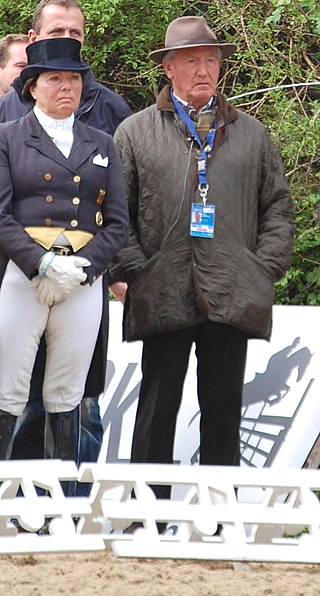Related Research Articles

West Germany competed at the 1976 Summer Olympics in Montreal, Quebec, Canada. 290 competitors, 233 men and 57 women, took part in 163 events in 20 sports.

Germany competed at the 2000 Summer Olympics in Sydney, Australia. 422 competitors, 241 men and 181 women, took part in 234 events in 29 sports.

Germany competed at the 1992 Summer Olympics in Barcelona, Spain. It was the first time the European nation participated after German reunification in 1990 and for the first time as a single nation since 1936. Previously, West Germany and East Germany had sent independent teams to the Games. 463 competitors, 300 men and 163 women, took part in 237 events in 26 sports.

Athletes from East Germany competed at the 1972 Summer Olympics in Munich, West Germany. 297 competitors, 231 men and 66 women, took part in 161 events in 18 sports.

Klaus Beer was a track and field athlete active in the 1960s for East Germany. Beer is best known for having won the silver medal in the long jump at the 1968 Summer Olympics, well behind Bob Beamon's record setting performance – Beamon jumped 8.90 m, while Beer jumped 8.19 m.

Athletes from East Germany and West Germany competed together as the United Team of Germany for the last time at the 1964 Summer Olympics in Tokyo, Japan. 337 competitors, 275 men and 62 women, took part in 159 events in 19 sports.

Athletes from East Germany and West Germany competed together as the United Team of Germany at the 1960 Summer Olympics in Rome, Italy. 293 competitors, 238 men and 55 women, took part in 148 events in 17 sports.

Germany was represented at the 1956 Summer Olympics by a United Team of Germany of athletes from the Federal Republic of Germany (FRG) and, for the first time at Summer Games, also from East Germany which had not joined in 1952. Also, the Saarland athletes who had to enter as a separate team in 1952 could now join in even though the accession of their state was not yet in effect. Thus, this was the only Olympic team ever to comprise athletes from three German states.

Athletes from West Germany competed at the 1968 Summer Olympics in Mexico City, Mexico. It was the first time that East Germany and West Germany sent separate teams to the Summer Olympic Games. 275 competitors, 232 men and 43 women, took part in 154 events in 17 sports for West Germany. As the country hosted the next Olympics in Munich, the West German flag was raised at the closing ceremony.

Athletes from East Germany competed at the 1968 Summer Olympics in Mexico City, Mexico. 226 competitors, 186 men and 40 women, took part in 124 events in 18 sports. It was the first time that West Germany and East Germany had sent separate teams to the Summer Olympic Games.

Germany competed at the 1952 Summer Olympics in Helsinki, Finland. 205 competitors, 173 men and 32 women, took part in 123 events in 18 sports.

Klaus Köste was a German gymnast. He won a gold medal in the vault at the 1972 Summer Olympics in Munich. He competed for East Germany and won bronze medals in the team all-around event in three Olympics, in 1964, 1968 and 1972. He was particularly strong on the horizontal bar, winning the 1971 and 1973 European championships and a bronze medal at the 1970 World championship in this event.

Klaus Balkenhol is a German equestrian and Olympic champion. He won a gold medal in team dressage at the 1992 Summer Olympics in Barcelona with the team from Germany. Balkenhol is the author of several dressage books. He is an avid member of Xenophen, and like Philippe Karl petitions against the use of rollkur. Balkenhol's earlier riding career consisted of being a mounted policeman. He was also the coach of the U.S. Olympic team. He also received a gold medal with the German team in 1996. At present Balkenhol is the trainer of Olympic equestrian Laura Bechtolsheimer.
Klaus Riekemann is a rower who competed for the United Team of Germany as a West German in the 1960 Summer Olympics.

Klaus Zerta is a retired German rowing coxswain. He was part of the West German team that won gold medals at the 1960 Summer Olympics in the coxed pair event competing for the United Team of Germany. Zerta was the youngest medalist at the 1960 Games. He is the youngest confirmed male gold medalist in Olympic history. He was 13 years and 283 days when he won the gold in the men's coxed pair in 1960.

Klaus Aeffke is a retired German rower who was most successful in the eights. In this event he won a silver medal at the 1964 Summer Olympics, a world title in 1962, and three European titles in 1963–1965.

Klaus Behrens was a German rower who was most successful in the eights. In this event he won a silver medal at the 1964 Summer Olympics, a world title in 1962, and three European titles in 1963–1965.
Klaus Trummer is a former East German slalom canoeist who competed in the early to mid-1970s. He won six medals at the ICF Canoe Slalom World Championships with four golds, a silver and a bronze.
Klaus Reichert is a German fencer. He won a gold medal in the team foil event at the 1976 Summer Olympics and a silver in the same event at the 1984 Summer Olympics.
Klaus Erich Bahner was a German former field hockey player who competed at the 1964 Summer Olympics and the 1968 Summer Olympics. He was born in Crimmitschau, Saxony, Germany.
References
- ↑ "Klaus Allisat Olympic Results". sports-reference.com. Archived from the original on 17 April 2020. Retrieved 17 December 2010.